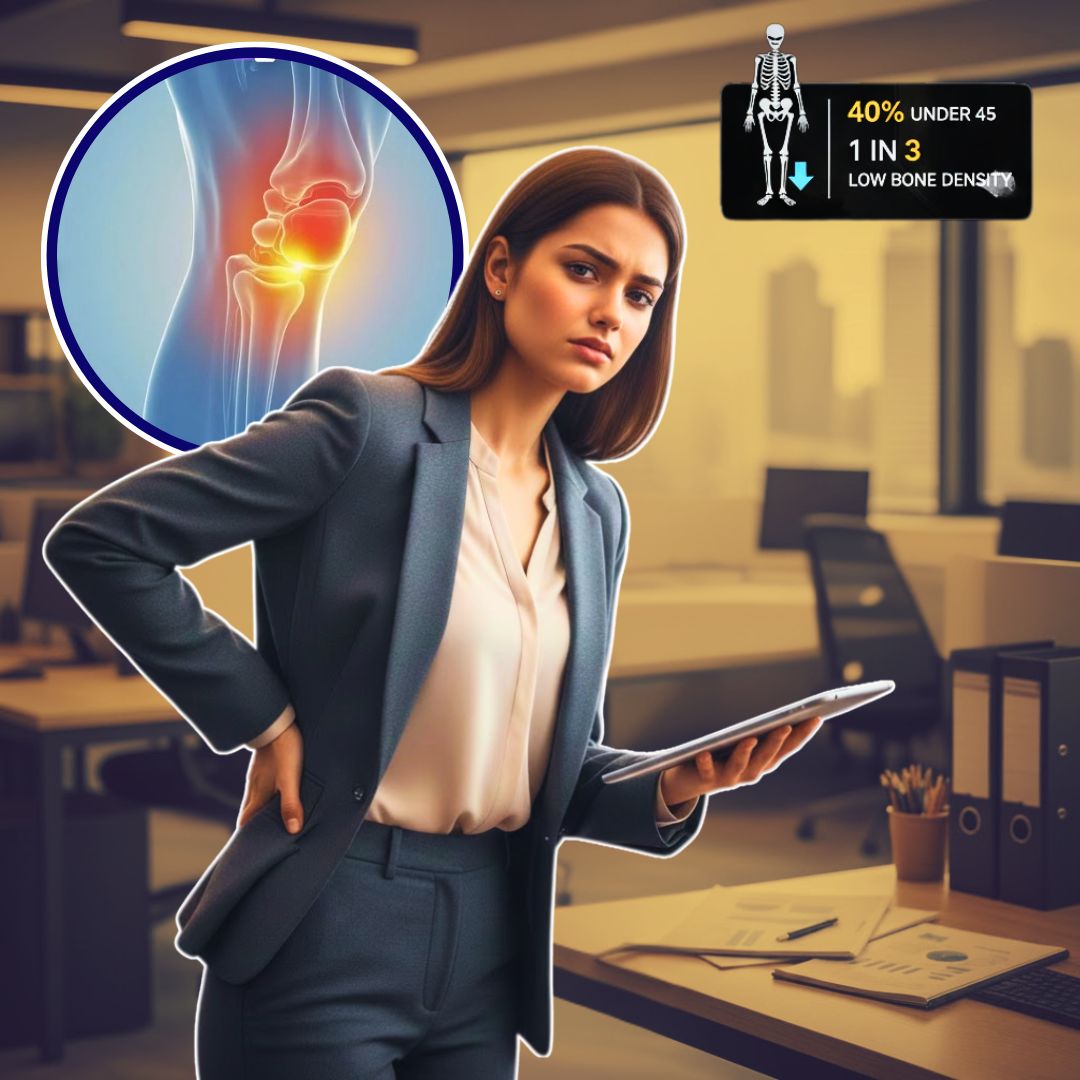A growing bone health crisis is emerging among working women in India, with nearly 40% of women under the age of 45 reporting symptoms related to bone weakness, such as knee pain, backaches, fatigue, and postural problems.
One in three women aged 25 to 35 suffers from low bone density or vitamin D deficiency, conditions traditionally seen in older women.
Doctors attribute this crisis to sedentary lifestyles, stress, poor diet, long indoor hours with insufficient sunlight, and irregular eating habits.
Experts urge timely screening, nutritious diets, daily physical activity, and increased awareness to combat this silent epidemic affecting younger working women.
Early Onset Bone Health Issues Among Working Women
Bone health issues including osteoporosis and vitamin D deficiency, once considered ailments predominantly affecting post-menopausal women, are now being diagnosed increasingly among young working women in their 20s, 30s, and early 40s.
Dr Anup Gadekar, an Orthopedic Surgeon at Apollo Spectra Pune, explains that many working women suffer from early osteoporosis, joint pain, and vitamin D deficiency primarily due to long hours of sitting in one position, poor posture, and lifestyle factors such as skipping meals and excessive caffeine intake.
He noted that almost 40% of women under 45 visiting outpatient departments report persistent knee pain, back discomfort, fatigue, and postural issues. Of greater concern is the finding that 1 in 3 women between 25-35 years have low bone density or vitamin D deficiency, highlighting a silent epidemic emerging among the younger female population.
Dr Deepak Gautam, Consultant Joint Replacement and Director of Orthopedic Disciplines at Medicover Hospitals, Navi Mumbai, corroborates these findings, noting that symptoms commonly seen after menopause-like joint pain, stiffness, and fractures-are now manifesting earlier.
Factors such as poor diet, insufficient physical activity, lack of sunlight exposure, and long working hours indoors contribute significantly to bone health deterioration in young women.
Experts emphasise the importance of consuming calcium-rich foods such as leafy green vegetables, nuts, soy products, and tofu, alongside regular exercise and sunlight exposure of at least 20 minutes daily. Routine bone density screenings as advised by healthcare professionals are critical for early detection and prevention of serious complications.
Background and Contributing Lifestyle Factors
Traditionally, bone health problems such as osteoporosis were a concern primarily for women post-menopause, who face natural hormonal changes causing bone density loss. However, evolving lifestyles have shifted this pattern drastically.
With more women engaged in sedentary office or home-based work environments, hours spent indoors limit vitamin D synthesis from sunlight exposure, which is vital for calcium absorption and bone strength.
Stress, irregular diet patterns, skipping meals, excessive caffeine consumption, and lack of physical activity exacerbate the problem.
Additionally, working women often neglect routine health check-ups and dismiss early symptoms, leading to advanced stages of bone weakness, fractures, posture deformities, and mobility issues.
This converging health concern among younger Indian women signals a silent epidemic requiring urgent public health intervention and widespread awareness campaigns to educate women and encourage preventive care.
Expert Advice for Prevention and Management
Doctors recommend early diagnosis through bone density testing, particularly for women with risk factors, alongside routine vitamin D and calcium screening.
“Daily care is key; bone health is not merely about age but about awareness,” he remarked. Maintaining proper posture during work, avoiding long static sitting, and taking breaks for movement can reduce strain. Dr Deepak Gautam advises consuming calcium-rich foods like leafy greens, nuts, soybeans, and tofu, alongside at least 20 minutes of sunlight exposure daily.
Regular exercise and stress management improve bone metabolism and overall health. Orthopedic specialists also stress the importance of protein as an integral nutrient for bone repair and strength.
Dr Anjali Mehta suggests consulting an orthopedic specialist regularly, especially after 40, to prevent worsening bone health. Awareness events like World Osteoporosis Day further highlight the critical need for preventive care.
The Logical Indian’s Perspective
The emerging bone health crisis among working women in India calls for a multifaceted approach that combines medical awareness, lifestyle education, and supportive workplace environments.
The Logical Indian advocates for workplaces to actively encourage health-friendly practices such as regular breaks for movement, promoting balanced diets, and facilitating access to routine health screenings. Policies aimed at reducing sedentary work hours and stress, while fostering empathy and proactive health management, can significantly improve women’s bone health outcomes.
Fostering a culture of kindness and dialogue around workplace wellness can empower women to prioritise their health without stigma or neglect.












